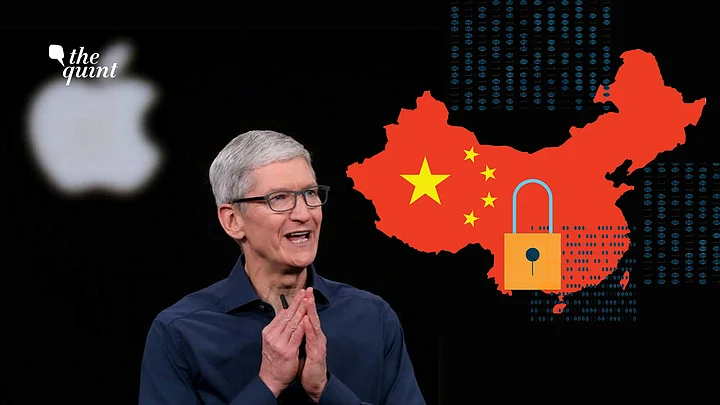US tech giant Apple has reportedly risked its Chinese customers’ data and aided the Chinese government’s censorship by contradicting its own privacy policy and censoring apps that conflict with local regulations.
An investigation by The New York Times revealed that Apple is ready to share the Chinese users’ data with the government, which is against its so-called 'carefully-crafted' privacy policies.
China is a critical region for Apple, as the tech giant assembles nearly all of its products in China and one-fifth of its sales comes from the country, as per media reports.
The report says that Chinese government has used this as leverage and has pressured Apple into making compromises that the company doesn’t make in any of its other countries.
Several concerns have raised stating that Apple’s compromises in China could result in Indian authorities asking for similar concessions in the future.
5 Takeaways from The NYT Investigation
Below are some of the major findings of the NYT investigation:
- Apple now shares the data of its Chinese users with the government, this is against Apple's carefully crafted privacy polices.
- Apple is building a centre in China's Guiyang which is expected to be finished by the end of June. Chinese government employees will be physically controlling the place where Apple's servers will store the local users' data. While Apple claims that all the data will be encrypted, but the keys to decrypt such files will also be kept in China.
- Apple has trained its app reviewers to remove any apps from Appstore that have the following keywords 'Tiananmen Square', the Chinese spiritual movement 'Falun Gong', 'the Dalai Lama', and independence for Tibet and Taiwan.
- At least 55,000 apps have been removed from the App Store in China since 2017, according to data provided by Sensor Tower to Apple Insider website.
- Foreign news outlets, encrypted messaging apps, gay dating services, as well as platforms like VPNs that allow users to bypass internet restrictions are among those disappeared apps.
'India Could Follow Suit'
Apple’s dependency on the Chinese market has allowed their government to exercise control over the multinational company in a way Apple never envisioned possibly.
It has effectively risked its customers’ data by giving up control and has also been noticed proactively aiding censorship in China in a bid to appease the government.
This is especially striking since Apple has been seen as a miss in complying with China’s laws. The company has often touted its commitment to data privacy, security, and civil liberties, but has now left the interest of its Chinese consumers in the hands of their government.
Industry expert Vaibhav Lall, Founder of Khojdeal told The Quint that the matter of strict regulations being set in place for Apple in China, production might shift to India and Vietnam for a more autonomous functioning.
"Since Indian authorities have also ramped up control over their citizens’ data, India could also follow suit and demand Apple to make similar concessions regarding consumer data. As Apple complies with the Chinese government, it should also allow the Indian government more leverage over policy considerations if Apple decides to move production to India," he added.
Should Indians worry?
As Apple allows Chinese consumer data to be stored on government servers, ready to be reviewed or removed as per government policy, and if India wrongly steps into similar shoes, "it could spell disaster for the Indian Apple consumer," according to Lall.
The Personal Data Protection (PDP) Bill, 2019, mandates that sensitive personal data must be stored within the country. "As Apple complies with Chinese regulations, it could see itself being asked the same if they move their production to India", Lall told The Quint.
Lal explained that Apple had to use different encryption technology for their consumers’ data in China, which allows officials to access the said data whenever they want.
He further said,"This effectively breaks end-to-end encryption and allows the government to inspect their citizens' personal data. Similarly, Indian policy within the PDP Bill also argues that platforms should enable traceability whenever the government deems necessary, again, breaking end-to-end encryption."
“If such policies become active in India, the basic right of each individual to the protection of personal data might become history.”Privacy policy expert Vaibhav Lall
(At The Quint, we question everything. Play an active role in shaping our journalism by becoming a member today.)
